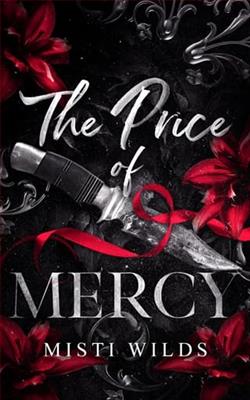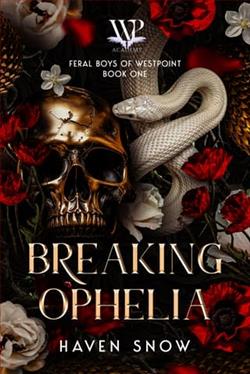Page 59 of Curse in the Quarter
This was Maestro’s private fae gathering space, steeped in illusion so thick that reality bent like stage lights through silk. The building itself flickered between states—sometimes a grand opera house in its prime, burgundy velvet seats pristine and gleaming, crystal chandeliers casting rainbow patterns across marble columns. Other times it showed its true decay: rotted floorboards, moth-eaten curtains, and the musty smell of abandonment that clung to forgotten places.
Tonight, the glamour was strong. Phantom audiences filled the seats—translucent figures in period dress from different eras, all watching with hungry eyes that tracked Bastien’s movement as he pushed through the unmarked door. The familiar weight of iron rings burned against his fingers as the glamour recognized him and reluctantly parted, allowing him entry into this space between worlds.
“Punctual as always,” Maestro said without looking up. His appearance had shifted since their last encounter, now wearing the face of a nineteenth century composer—beautiful, androgynous, with eyes that held the weight of centuries. “Though I confess, I had hoped you might take a bit longer to arrive. The anticipation is half the pleasure for me.”
Bastien descended the carpeted stairs, noting how each step felt heavier than the last. The glamour was working against him, trying to slow his approach. “Enough games. I know what you've been doing.”
“Do you?” Maestro's fingers moved to a minor key, the music taking on an ominous undertone. “I rather doubt that. Your species has such limited perspective. You seefragments—a soul-bond here, a harvested emotion there—and think you understand the symphony.”
Maestro’s fingersnever missed a note, though Bastien could see the slight tilt of his head as he spoke. The fae was beautiful in the way that dangerous things often were—ageless features that shifted between masculine and feminine depending on the angle of light, hair that caught the phantom footlights and reflected colors that had no earthly names. When he finally spoke, his words carried the trained projection of someone who had spent centuries performing for audiences both seen and unseen.
The shadowy audience leaned forward in their seats, hunger radiating from them like heat. Bastien realized they weren't shadows at all, but humans drained of their essential selves, kept as ornaments in Maestro's private theater. The thought made his stomach turn.
“I know you've been harvesting soul-bonds,” Bastien said, his hand resting on the iron blade at his hip. “Using them to power something bigger. The question is what.”
Maestro laughed, a sound like silver bells mixed with breaking glass. “Harvesting. Such a crude word for something so elegant.” He rose from the piano bench with fluid grace, his form rippling between different appearances—young man, old woman, something neither and both. The music stopped abruptly, silence crashing down like a velvet curtain. In that sudden quiet, Bastien could hear the whispered conversations of the phantom audience—fragments of dialogue from performances past and future, critiques and compliments echoing across temporal streams. “Such crude terminology,” Maestro said. “I prefer to think of it as cultivation . . . as . . . distribution. Sharing the wealth, as it were. Iplant seeds of connection between souls, tend them across lifetimes, and when they reach perfect resonance?—”
“Call it what you want.” Bastien moved closer, noting how each step felt like walking through honey, the glamour making every movement deliberate and dreamlike. “You’re selling pieces of something that doesn’t belong to you.”
“Belong to me?” The fae turned fully now, fixing Bastien with eyes that held the depth of centuries. His smile was sharp as broken glass, beautiful and cutting in equal measure. “Dear Bastien, I created them. Every fragment, every whisper of power—they’re all fruits of my labor.” He gestured expansively to encompass the grand illusion surrounding them. “I’ve been expecting this visit. In fact, I’ve been rather looking forward to it.”
The casual admission sent a chill down Bastien’s spine. He’d come here expecting to catch Maestro off guard, to demand answers and perhaps extract some kind of confession. Instead, he found himself feeling like an actor who had walked onto a stage where everyone else knew their lines.
“What the hell are you talking about?” Bastien’s hand moved instinctively to the iron blade at his hip, the familiar weight a comfort against the unreality surrounding him.
“Soul line cultivation,” Maestro said, beginning to pace the small orchestra pit with the restless energy of a caged predator. “Not the parlor tricks your Maman performs with her bones and herbs, though I do admire her dedication to the craft. I speak of true cultivation—the kind that requires patience measured in decades rather than seasons.”
The phantom audience leaned forward in their seats, as if this were the moment they’d all been waiting for. Bastien could feel their anticipation like a physical weight pressing against his shoulders.
“I’ve been cultivating threads across reincarnated linesfor over a century,” Maestro continued, his tone taking on the cadence of a conductor building toward crescendo. “Your precious Delphine isn’t the first Charlotte I’ve encountered. Oh no, she’s merely the latest in a long and fascinating line of iterations.”
The words drove the air from his lungs. “What?”
“You see, dear Bastien, I have been orchestrating soul-bond harvesting across multiple bloodlines for centuries. Each connection I cultivate becomes stronger than the last, feeding on the emotional resonance of previous iterations. The Lacroix line has been particularly . . . fertile.”
Bastien couldn’t fathom how Charlotte had reincarnated other lifetimes and he had not been a part of them.
“Charlotte-the-seamstress in 1847,” Maestro began, counting off on his fingers with theatrical precision. “She could see through the Veil clear as daylight but lacked the will to act on what she witnessed. Fascinating to observe, but ultimately useless for my purposes. Then there was Charlotte-the-painter in 1923—now she had the power, raw and untamed, but not the emotional stability to channel it properly. She painted the most extraordinary scenes of the otherworld, you know. I still have several of her canvases. Would you like to see them?”
Bastien’s vision was starting to blur at the edges, reality becoming as unstable as the glamour surrounding them. “You’re lying.”
“Charlotte-the-teacher in 1967,” Maestro continued as if he hadn’t heard the interruption. “She came so very close to fulfilling the potential I’d been nurturing. Had the power, had the stability, even had the emotional depth necessary for the work. But she broke under the pressure when she realized what was being asked of her. Tragic, really. I’d grown quite fond of that incarnation.”
The fae gestured to the phantom audience, and suddenly Bastien could see them clearly—different faces, different clothing styles spanning more than a century, but something achingly familiar in each of their expressions. The same intelligent eyes, the same stubborn set to their jaws, the same way of tilting their heads when listening intently. Charlotte’s soul, wearing different faces across different lifetimes, all of them staring back at him with expressions that ranged from hope to despair to bitter resignation.
“So many attempts,” Maestro said, his words softening with what might have been genuine affection. “So many failures. Each one taught me something new about the delicate balance required—how to guide the awakening without overwhelming the vessel, how to strengthen the connection without shattering the mind that contained it.”
“You manipulative—” Bastien started forward, iron singing as it cleared its sheath, but Maestro raised a hand and suddenly the air between them became thick as molasses, impossible to push through.
“But Delphine,” the fae continued, his voice now taking on an almost parental pride, “she is the most stable yet. The successful culmination of decades of careful work, of trial and error, of learning from each beautiful failure that came before.” His eyes gleamed with ancient satisfaction. “Each lifetime taught me how to better prepare the vessel, how to ensure she would be strong enough to bear what must be borne.”
The paralysis released suddenly, sending Bastien stumbling forward. His rage was a living thing now, burning in his chest like molten iron. “What do you intend to do with her?”
Maestro laughed, the sound like crystal bells caught in ahurricane—beautiful and terrible and completely alien. “Intend? My dear boy, I don’t intend anything. I simply nurture what was already planted long ago. I tend the garden that was sown with a bargain made in blood and starlight over a century past.”
“Stop speaking in riddles,” Bastien snarled, but even as he spoke, he could feel the truth of it settling in his bones like a winter chill.
“Keys buried in every soul,” Maestro said, moving closer with that fluid, inhuman grace. His form flickered as he walked, sometimes solid flesh and bone, sometimes something made of silk and starlight and whispered promises. “Waiting for the right moment to turn, the proper conditions to unlock what lies dormant within. Some keys unlock with grief—I’ve seen souls crack wide open at the moment of deepest loss, spilling their secrets like wine from a broken bottle. Others require blood, violence, the stark shock of mortality pressed against immortal truths.”















